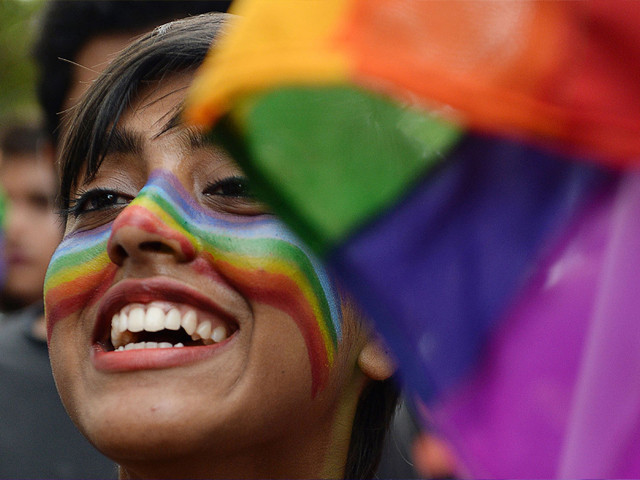One of the most glaring anomalies in the Indian legal landscape is Article 377, the 1861 law that criminalises gay sex. This law, inspired by Victorian era prudishness, should have no place in the India of 2018.
The British, who created this law based on their values of that time, have now adopted much more liberal and progressive outlooks. Meanwhile, the Indian state has refused to move on. In fact, it has appropriated those archaic values and keeps them entrenched and alive in the country’s legal code.
This is ironic, and perhaps tragic, because through the course of history, the Indic civilisation has been very permissive and open to exploring all facets of sexuality. The Kamasutra and references to characters like Shikhandi and Chitrangada in the Mahabharata are just some examples of the acceptance and acknowledgement of what might be considered “alternate lifestyles” today.
Over the last few centuries, Indian society has taken a more conservative turn, perhaps influenced by the values of foreign rulers who followed monotheistic and strictly codified faiths that abhorred sexual expression. Therefore in large parts of the country, homosexuality, and in fact any kind of free sexual expression, are frowned upon and viewed as perversion.
Article 377 serves to reinforce this social bias. Not only does it criminalise homosexuality, it also closes any avenues a lesbian, gay, bisexual and transgender (LGBT) person might have to seek protection against any discrimination or violence. It also gives antagonists the license to threaten and browbeat the LGBT community.
The Indian government refuses to criminalise marital rape. Men accused of unwanted sexual advances and rape, often escape censure or punishment. However, two adults, in a loving and consensual relationship can be severely punished, just because of their sexual orientation. This has to change.
Fortunately, there has been a concerted effort to rectify this legal anomaly that’s been going on for several years. The movement has managed to chip away at Article 377 and in 2009, the Delhi High Court had even struck it down. Unfortunately in 2013, the Supreme Court reversed that decision. The petitions against that ruling are now being heard and there is optimism that this anachronistic law will finally be consigned to the dustbin of history.
This will be a huge step for a country that prides itself as being a liberal democracy that does not discriminate on the basis of religion, race or gender. Just like the aforementioned characteristics, sexual orientation should not be grounds for discrimination either.
Several social movements have evolved as part of a three-stage process. In the first stage, a core group of activists raise awareness. That core group spreads its message and acquires critical mass, though not necessarily a majority across the general population, giving the movement a voice that government hears. Legal reform then follows in the second stage. The third stage happens once the laws change. Gradually, large sections of society adopt the reformed values. We’ve seen that with the civil rights movement in the US, universal adult suffrage, and many more.
The LGBT community contributes richly to India – socially, culturally and economically, and deserves the space to live with dignity. A change in the arcane laws around their lifestyle would also set the tone for greater social change.
Youngsters belonging to this community grapple with inner conflict over their sexual orientation. The fear and shame of the attached social stigma and criminality exacerbate this conflict. A change in the laws would also provide an enabling environment that can help them understand themselves better and not feel like a deviant or a criminal.
If decriminalisation does take place, the LGBT youth will be able to come out more freely and just be themselves, rather than trying to hide their sexual orientation. Imagine the burden of going about your daily life while trying to hide a fundamental part of who you are. The fear of being bullied by classmates, the fear of being ridiculed by the neighbours, the fear of being harassed by the cops, and the fear of prosecution can be a huge drag on a young individual’s aspirations and zest for life. It’s just not fair. A change in the law can unburden an entire community and enable it to flourish and make an even larger contribution to the country.
Indian society needs greater tolerance and sensitivity towards people who are not part of the mainstream. The end of Article 377 will be a monumental event in building an India that does not fear and demonise sexuality. In fact, it will move closer to its rich civilisational heritage of openness, inclusion and celebrating healthy sexuality. It will also strip away one more vestige of undesirable colonial imposition.
India’s awakening: The end of Article 377 and the last shred of colonialism
This will be a huge step for a country that prides itself as being a liberal democracy that does not discriminate.

An Indian supporter of the lesbian, gay, bisexual, transgender (LGBT) community takes part in a pride parade in in Chennai on June 24, 2018. PHOTO: AFP


COMMENTS
Comments are moderated and generally will be posted if they are on-topic and not abusive.
For more information, please see our Comments FAQ